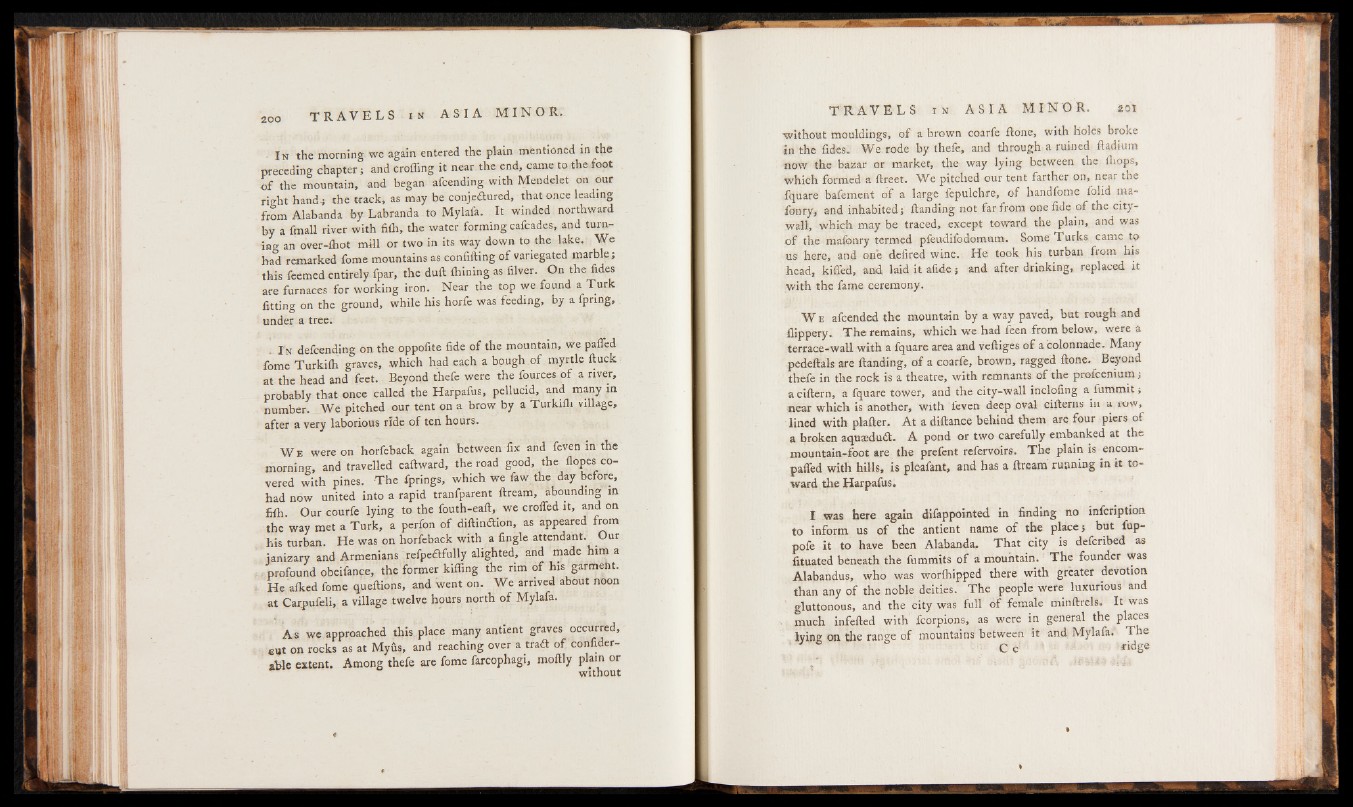
In the morning we again entered the plain mentioned in the
preceding chapter; and eroding it near the end, came to the foot
o f the mountain, and began afeending with Mendelet on our
right hand; the track, as may be conjedtured, that once leading
from Alabanda by Labranda to Mylafa. It winded northward
by a fmall river with fi(h, the water forming cafcades, and turning
an over-fliot mill or two in its way down to the lake. We
had remarked fome mountains as confiding of variegated marble;
this feemed entirely fpar, the dufl Alining as iilver. On the fides
are furnaces for working iron. Near the top we found a Turk
fitting on the ground, while his horfe was feeding, by a fpring,
under a tree.
. I n defeending on the oppofite fide of the mountain, we pafled
fome Turkilh graves, which had each a bough of. myrtle ftuck
at the head and feet. Beyond thefe were the fources of a river,
probably that once called the Harpafus, pellucid, and many in
number. We pitched our tent on a brow by a Turkifh village,
after a very laborious ride of ten hours.
W e were on horfeback again between fix and feven in the
morning, and travelled eaftward, the road good, the dopes covered
with pines. The fprings, which we faw the day before,
had now united into a rapid tranfparent ftream, mounding in
fifli. Our courfe lying to the fouth-eafl, we croffed it, and on
the way met a Turk, a perfon of diflindtion, as appeared from
his turban. He was on horfeback with a Angle attendant. Our
janizary and Armenians refpeafully alighted, and made him a
profound obeifance, the former kiffing the rim of his garmeht.
He alked fome queftions, and went on. We arrived about noon
at Carpufeli, a village twelve hours north of Mylafa.
A s we approached this place many antient graves occurred,
cut on rocks as at Myus, and reaching over a trad of confiderable
extent. Among thefe are fome farcophagi, mofily plain or
without
without mouldings, o f a brown coarfe flone, with holes broke
in the fides. We rode by thefe, and through a ruined ftadium
now the bazar or market, the way lying between the (hops,
which formed a ftreet. We pitched our tent farther on, near the
fquare bafement of a large fepulchre, of handfome folid ma-
fonry, and inhabited; Handing not far from one fide of the city-
wall, which may be traced, except toward the plain, and was
o f the malbnry termed pfeudifodomum. Some Turks came to
us here, and one defired wine. He took his turban from his
head, kiffed, and laid it afide; and after drinking, replaced it
with the fame ceremony.
W e afeended the mountain by a way paved, but rough and
flippery. The remains, which we had feen from below, were a
terrace-wall with a fquare area and veftiges of a colonnade. Many
pedeflals are Handing, of a coarfe, brown, ragged flone. Beyond
thefe in the rock is a theatre, with remnants of the profeenium;
a ciflern, a fquare tower, and the city-wall inclofing a fummit;
near which is another, with feven deep oval ciflerns in a row,
lined with plafler. At a diflance behind them are four piers of
a broken aquaedudt. A pond or two carefully embanked at the
mountain-foot are the prefent refervoirs. The plain is encom-
paffed with hills, is pleafant, and has a flream running in it toward
the Harpafus.
I was here again difappointed in finding no infeription
to inform us of the antient name of the place; but fup-
pofe it to have been Alabanda. That city is deferibed as
fituated beneath the fummits of a mountain. The founder was
Alabandus, who was worfbipped there with greater devotion
than any of the noble deities. The people were luxurious and
gluttonous, and the city was full of female minflrels. It was
much infefled with fcorpions, as were in general the places
Ivin? on the ran°-e of mountains between it and Mylafa. The
3 6 C c «dge